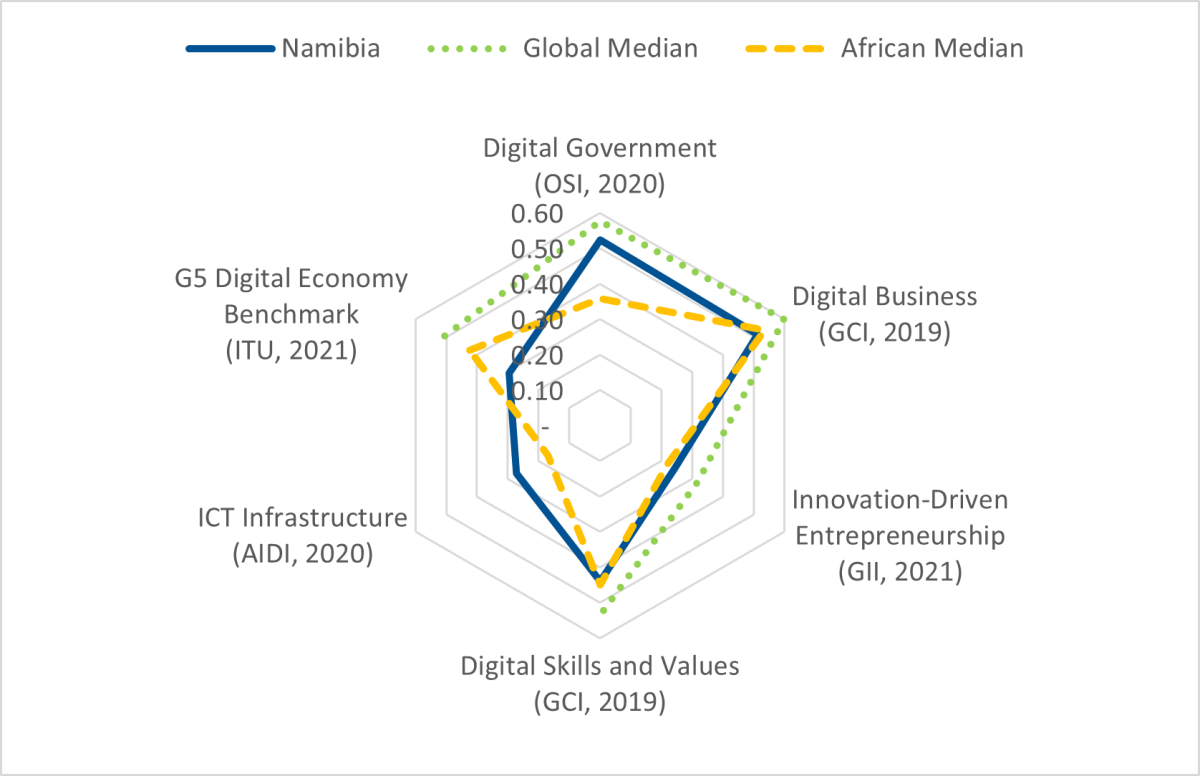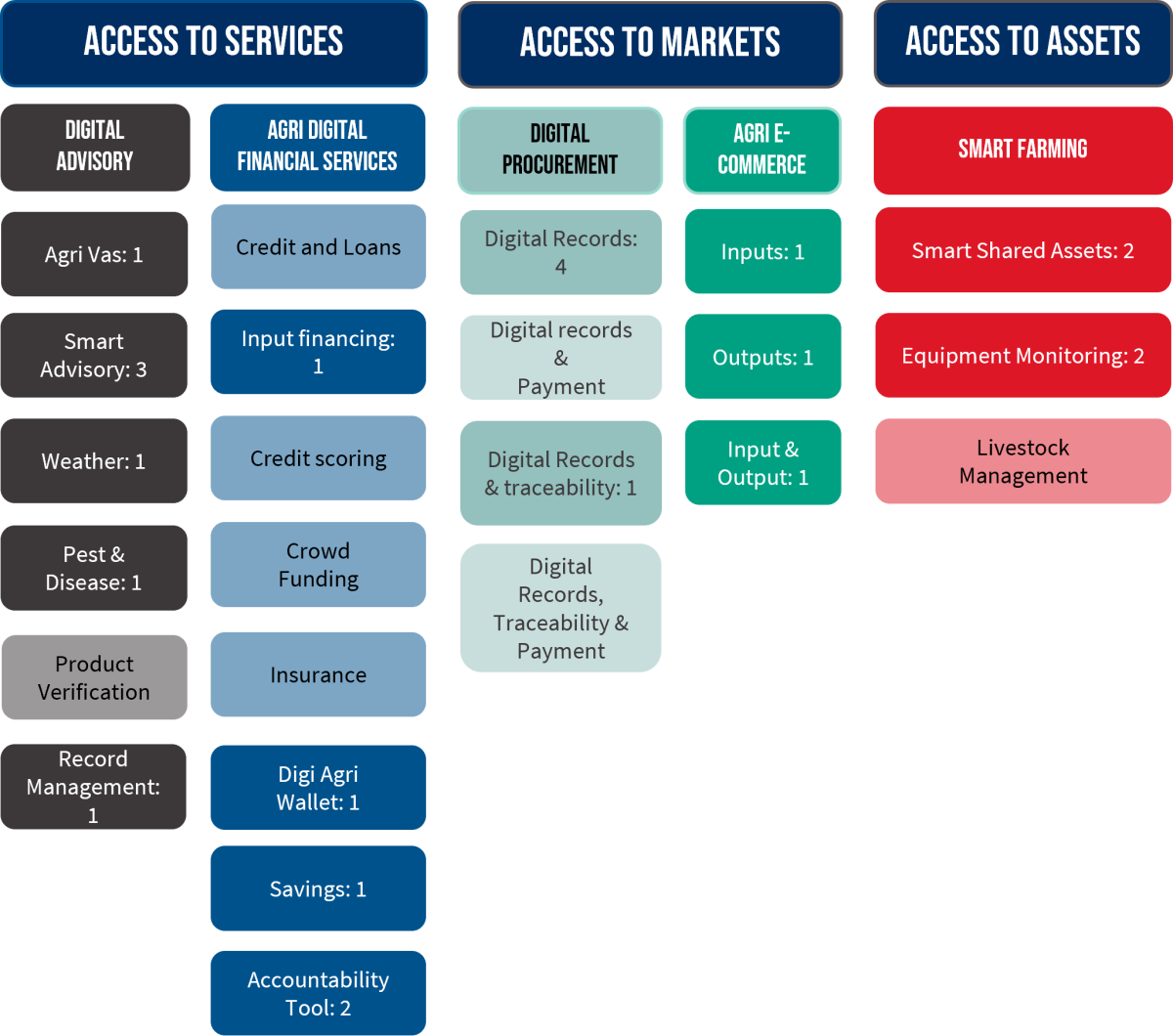Caption: Interactive map presenting country specific data, including universities and incubators contacted for the study and the digital innovations identified at the time of the study
Full Country Report (PDF)
Namibia Ranked 8 out of 16 Countries in the Benchmark
The benchmark assessment reflects the extent to which Namibia is unlocking positive pathways towards a digital economy and supporting a vibrant ecosystem of different actors.

Caption: Results from Benchmark Assessment for Namibia
Namibia ranked 8 out of 16 in the benchmark assessment which suggests that it has some key foundational pillars necessary for a robust digital economy.
Namibia ranked lowest (13) in the G5 digital economy benchmark (which identifies the presence of policies and regulations that are dynamic and flexible and promote the digital economy).
| Group | Country | Benchmark Index Score (Adjusted) | Overall Benchmark Ranking |
|---|---|---|---|
| 1 | South Africa | 0.5891 | 1 |
| Mauritius | 0.5839 | 2 | |
| Seychelles | 0.5155 | 3 | |
| Global Median | 0.5064 | ||
| 2 | Eswatini | 0.4222 | 4 |
| Tanzania | 0.4138 | 5 | |
| Botswana | 0.4114 | 6 | |
| 3 | Zimbabwe | 0.3895 | 7 |
| Namibia | 0.3809 | 8 | |
| Lesotho | 0.3802 | 9 | |
| African Median | 0.3595 | ||
| Zambia | 0.3506 | 10 | |
| Malawi | 0.3483 | 11 | |
| Madagascar | 0.3005 | 12 | |
| 4 | Angola | 0.2985 | 13 |
| Mozambique | 0.2919 | 14 | |
| DR Congo | 0.2782 | 15 | |
| Comoros | 0.2497 | 16 |
Caption: Overall Benchmark Assessment Results and Rank for all SADC member states
For further information on the benchmark results and regional trends please read the Situational Analysis Report.
Digitalization Is Being Prioritized in Namibia Generally but Not in Agricultural Policies and Strategies
Eight key documents were reviewed that focus on ICT dissemination, supporting an enabling environment for the ICT sector, e-Government, universal access, digital skills, and cyber security.
Three national plans have also stressed the importance for greater connectivity, digital inclusion, and a greater focus on legal frameworks that enable the use of emerging technologies in Namibia.
There is also a National Digital Strategy in development which reiterates the prioritization by Government of this agenda for development and growth.
Despite the positive progress in national policies and plans generally, there is limited evidence to suggest that this focus on digital transformation has transferred to agricultural policies.
16 Innovations were Identified with Most Providing Digital Procurement Solutions
The use cases from Namibia illustrate that the most common innovations were related to digital procurement solutions, followed by digital advisory, agri e-commerce, smart farming and digital financial services.

Caption: Diagram illustrating number of identified innovations and their sub use case solutions.
Most innovations in Namibia are around planning, input acquisition, on-farm production to post harvest components and access to markets.

Caption: Diagram illustrating number of innovations identified in each phase of the value chain.
Many of the challenges cited by innovators referred to farmer uptake and behavior change, and these may be related more to digital and language literacy levels and age. A lack of technical capacity for teams, data collection and product development constraints, point to a lack of digital skills in Namibia to drive advances in these areas.
DIgital Agriculture Courses Seem to be well Integrated into the Curriculum of Agricultural Higher Education in Namibia
Digital agriculture courses are well integrated into the curriculum of agricultural higher education in Namibia, however, capacity building for digital entrepreneurship education is needed.
The University is well equipped in IT skills and digital trainings but those are not tailored to the agricultural entrepreneurship space.
The incubator interviewed has a strong need for digital and more specifically digital agriculture skills to be integrated into their entrepreneurship trainings.
Closer cooperation and exchange of competences between Universities and Incubators is suggested to improve the development of digital agriculture curricula for the incubator and integrate the entrepreneurship skills within the University courses.
Icons - credit to NounProject https://thenounproject.com/






